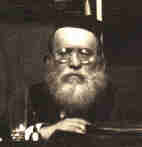 |
Hadrash Ve-Haiyunby the Reisha Rav, HaGoan Rav Aaron Levine TZ"LElucidated and Adapted by Efraim Levine |
 |
Hadrash Ve-Haiyunby the Reisha Rav, HaGoan Rav Aaron Levine TZ"LElucidated and Adapted by Efraim Levine |
Ki Savo
Dedicated
in Honor of
Nosson and Tzippy Levine
Upon Their Marriage
To Dedicate Please Contact Hadrash Ve-Haiyun
You shall be blessed in the city and
you shall be blessed in the field. The fruit of your
womb, the fruit of your earth, the fruit of your
animals, the offspring of your cattle and the herd
of your flock shall be blessed. Your basket and kneading
bowl shall be blessed. You shall be blessed when you enter
and you shall be blessed when you leave.
(Devarim 28:3-6)
There are two types of people who are blessed. The first type is the one who enjoys unusual good fortune in a specific place or field of work. However, in other places or fields of work this individual falls within the average if not below. The second type of individual is the one who enjoys good fortune in all places and in all fields of work.
In truth it can be said that the first type of individual does not enjoy true blessing. Because his blessing is confined to a specific place or field, it can be said that his good fortune is due to mazal. For some mystical reason it was preordained that this person be successful in a given place or field, not necessarily due to his righteousness. This concept is captured in the famous dictum “If one wishes to change his mazal he should change his place.” We see from this statement that success in a restricted area is within the realm of mazal. If this individual does not enjoy success here in this location, he should change his place and enter a different mazal and thus bring with it a change of fortune. On the other hand the individual who enjoys success in all places and fields is the one who is truly blessed. Since his blessings are not confined to a specific place or line of work it is certain that his success is not due to mazal but due to the special grace of Hashem. This type of blessing was the one we find with regard to Yosef. The posuk there states “His master (Potiphar) saw that Hashem was with him and that whatever he did Hashem caused him to be successful.” (Bereishis 39:3) We may interpret this posuk as follows: His master saw that his success was due to true blessing not just mazal. His master came to this conclusion because he was successful in everything that he did and was not limited to anything specific.
Likewise, the posukim here come to bless the Jewish people with true blessing not just with mazal. This blessing is underscored with the all-inclusive blessing of location, possession, occupation and direction.